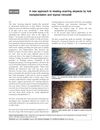11 citations,
March 2012 in “Journal of the American Academy of Dermatology” Most patients with dark skin were satisfied with laser hair removal and had few complications.
 June 2007 in “Journal of Investigative Dermatology”
June 2007 in “Journal of Investigative Dermatology” Title change to "Central Centrifugal Cicatricial Alopecia (CCCA)"; common in African American women; hair-grooming methods may contribute; no effective therapy found; trials needed.
 22 citations,
September 2004 in “Journal of The European Academy of Dermatology and Venereology”
22 citations,
September 2004 in “Journal of The European Academy of Dermatology and Venereology” Bimatoprost can cause longer, thicker, darker eyelashes and eyebrows.
 5 citations,
May 2021 in “BMC surgery”
5 citations,
May 2021 in “BMC surgery” A man's unusual scalp folds caused by a skin condition were treated with surgery and remained unchanged two years later.
2 citations,
December 2019 in “The Open Dermatology Journal” Linear Discoid Lupus Erythematosus of the scalp can cause hair loss and should be considered in similar cases.
 October 2022 in “Benha Journal of Applied Sciences”
October 2022 in “Benha Journal of Applied Sciences” Human Beta Defensin 1 levels do not predict the risk or severity of Alopecia Areata.
 23 citations,
December 2015 in “Anais Brasileiros de Dermatologia”
23 citations,
December 2015 in “Anais Brasileiros de Dermatologia” Permanent hair loss after bone marrow transplant can be caused by chemotherapy or chronic graft-versus-host disease.
 1 citations,
April 2018 in “The journal of investigative dermatology/Journal of investigative dermatology”
1 citations,
April 2018 in “The journal of investigative dermatology/Journal of investigative dermatology” Oral tofacitinib significantly improves lichen planopilaris symptoms without adverse effects.
July 2013 in “Indian Journal of Dentistry” A 46-year-old man showed symptoms of a rare condition usually seen in postmenopausal women, highlighting the need for dentist-dermatologist collaboration.
 17 citations,
January 2011 in “Indian journal of dermatology, venereology, and leprology”
17 citations,
January 2011 in “Indian journal of dermatology, venereology, and leprology” A rare genetic skin condition usually affecting males was found in a 9-year-old girl.
 1 citations,
December 2015 in “Vestnik dermatologii i venerologii”
1 citations,
December 2015 in “Vestnik dermatologii i venerologii” Patients with non-scarring alopecia often experience emotional disorders like depression and stress.
 January 2015 in “Вестник дерматологии и венерологии”
January 2015 in “Вестник дерматологии и венерологии” Patients with non-scarring hair loss often have emotional disorders.
 January 2024 in “Skin Research and Technology”
January 2024 in “Skin Research and Technology” Oral tofacitinib may be an effective future treatment for children with severe alopecia areata, but more research is needed.
 March 2004 in “Journal of The American Academy of Dermatology”
March 2004 in “Journal of The American Academy of Dermatology” Patients with systemic lupus erythematosus and hair loss had fewer hair follicles and non-scarring alopecia; direct immunofluorescence was not helpful in diagnosing lupus in these cases.
 3 citations,
April 2010 in “The American Journal of Dermatopathology”
3 citations,
April 2010 in “The American Journal of Dermatopathology” Most people with scarring and nonscarring hair loss show similar D2-40 levels, but some with scarring hair loss have higher levels.
 53 citations,
May 2010 in “Dermatologic Surgery”
53 citations,
May 2010 in “Dermatologic Surgery” Hair transplantation may not work for Frontal Fibrosing Alopecia as transplanted hair was lost when the disease came back.
 11 citations,
January 2010 in “Indian Journal of Dermatology, Venereology and Leprology”
11 citations,
January 2010 in “Indian Journal of Dermatology, Venereology and Leprology” Hair transplant and applying 5% minoxidil solution can effectively treat permanent hair loss, but it may change hair direction in some cases.
13 citations,
June 2012 in “Dermatologic Surgery” Severe scars need a mix of treatments for best results.
December 2005 in “Dermatologic surgery” Er:YAG laser therapy is ineffective for treating facial eruptive vellus hair cysts due to early recurrence and side effects.
4 citations,
May 2018 in “European journal of dermatology/EJD. European journal of dermatology” Fumaric acid esters might help treat alopecia areata, but more research is needed.
15 citations,
January 2006 in “British Journal of Dermatology” A woman with skin eruptions and hair loss improved significantly with ointment treatment.
 October 2016 in “Mağallaẗ Kulliyyaẗ al-ṭibb Baġdād”
October 2016 in “Mağallaẗ Kulliyyaẗ al-ṭibb Baġdād” Most Iraqi women with telogen effluvium did not have a clear cause for their hair loss, and few had significant thinning.
 1 citations,
February 2019 in “PubMed”
1 citations,
February 2019 in “PubMed” Minoxidil is effective in treating various types of hair loss and can improve quality of life, with combination therapies showing increased effectiveness.
 1 citations,
January 2019 in “Skin appendage disorders”
1 citations,
January 2019 in “Skin appendage disorders” A woman's sudden hair loss three years after a bone marrow transplant was a sign of chronic graft-versus-host disease but improved with treatment.
 January 2018 in “Elsevier eBooks”
January 2018 in “Elsevier eBooks” The document concludes that alopecia has various forms, each with specific treatments, but no definitive cure for certain types like CCCA has been proven.
 September 2023 in “Дерматовенерология, косметология”
September 2023 in “Дерматовенерология, косметология” Digital video microscopy is a useful non-invasive tool for diagnosing non-scarring alopecia.
 70 citations,
January 2015 in “Journal of Clinical and Diagnostic Research”
70 citations,
January 2015 in “Journal of Clinical and Diagnostic Research” Hair loss from Telogen Effluvium usually gets better within 6 months after addressing the cause.
 August 1998 in “Dermatologic Surgery”
August 1998 in “Dermatologic Surgery” Dr. George A. Farber recommends using follicular unit transplantation for hair restoration because it gives a more natural look and has fewer problems compared to the older miniflap technique.
 May 2023 in “Elsevier eBooks”
May 2023 in “Elsevier eBooks” Some treatments that modify the immune system might help with certain types of hair loss but haven't been explored for common hair loss alone.
 22 citations,
January 2014 in “International Journal of Trichology”
22 citations,
January 2014 in “International Journal of Trichology” Hair restoration surgery can lead to swelling, infections, scarring, numbness, hiccups, and poor hair growth.






















